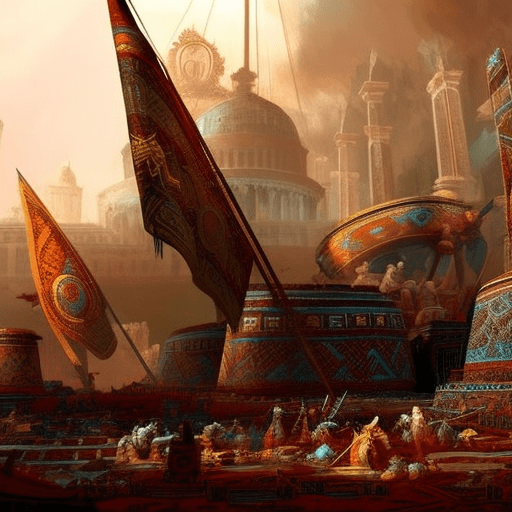One-line summary:
The Iliad is an epic poem by Homer that tells the story of the Trojan War, focusing on the hero Achilles and the destructive consequences of pride and rage.
The Story of the Trojan War:
The Iliad is set during the final year of the Trojan War, a conflict between the Greeks and the Trojans. The poem begins with the Greek army, led by Agamemnon, besieging the city of Troy. The Trojans, led by King Priam, are determined to defend their homeland. The central character of the poem is Achilles, the greatest warrior among the Greeks. However, Achilles withdraws from battle after a dispute with Agamemnon over a captured Trojan woman, Briseis. This decision has dire consequences for the Greek army as they struggle against the Trojans without their greatest warrior.
The poem is filled with epic battles, heroic deeds, and the intervention of gods and goddesses who take sides in the war. The gods play a significant role in the outcome of the conflict, often manipulating events to suit their own agendas. The Trojans are aided by Apollo, Aphrodite, and Ares, while the Greeks receive support from Athena, Hera, and Poseidon.
The Rage of Achilles:
The central theme of The Iliad is the destructive power of pride and rage. Achilles, driven by his wounded pride, refuses to fight for the Greeks and instead watches as his comrades suffer on the battlefield. His absence weakens the Greek army, and many soldiers die as a result. Achilles’ rage is fueled by the death of his close friend Patroclus, who is killed by Hector, the Trojan prince. Consumed by grief and anger, Achilles seeks revenge and returns to the battle, slaying Hector in a duel.
Throughout the poem, Achilles’ rage is contrasted with the wisdom and restraint of other characters, such as Hector and King Priam. The consequences of Achilles’ unchecked rage are devastating, leading to the deaths of numerous warriors and the destruction of Troy itself. The poem serves as a cautionary tale about the destructive nature of unchecked emotions and the importance of self-control.
The Human Cost of War:
The Iliad also explores the human cost of war. Homer vividly depicts the horrors of battle, the pain of loss, and the grief of those left behind. The poem emphasizes the individual stories and personal relationships of the warriors, highlighting their humanity amidst the chaos of war. The deaths of beloved characters, such as Patroclus and Hector, evoke a sense of tragedy and loss.
The Iliad also raises questions about the morality of war and the value of honor. While the Greeks fight for glory and the Trojans defend their homeland, the poem challenges the notion that war is noble or heroic. Instead, it portrays the devastating consequences of war, both on the battlefield and within the hearts and minds of the warriors.
Key Takeaways:
- The Iliad is an epic poem by Homer that tells the story of the Trojan War.
- The central character is Achilles, whose pride and rage have destructive consequences.
- The poem explores the human cost of war and questions the morality of conflict.
“Rage—Goddess, sing the rage of Peleus’ son Achilles,
murderous, doomed, that cost the Achaeans countless losses,
hurling down to the House of Death so many sturdy souls.”
In conclusion, The Iliad is a timeless epic that delves into the themes of pride, rage, and the human cost of war. Through the story of Achilles and the Trojan War, Homer reminds us of the destructive power of unchecked emotions and the tragic consequences of conflict. The poem serves as a powerful reminder of the importance of self-control, empathy, and the pursuit of peace.












